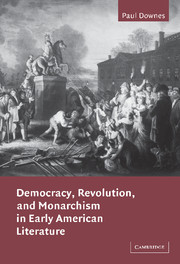Book contents
- Frontmatter
- Contents
- Preface
- Acknowledgments
- Introduction: the spell of democracy
- 1 Monarchophobia: reading the mock executions of 1776
- 2 Crèvecoeur's revolutionary loyalism
- 3 Citizen subjects: the memoirs of Stephen Burroughs and Benjamin Franklin
- 4 An epistemology of the ballot box: Brockden Brown's secrets
- 5 Luxury, effeminacy, corruption: Irving and the gender of democracy
- Afterword: the revolution's last word
- Notes
- Bibliography
- Index
Introduction: the spell of democracy
Published online by Cambridge University Press: 22 September 2009
- Frontmatter
- Contents
- Preface
- Acknowledgments
- Introduction: the spell of democracy
- 1 Monarchophobia: reading the mock executions of 1776
- 2 Crèvecoeur's revolutionary loyalism
- 3 Citizen subjects: the memoirs of Stephen Burroughs and Benjamin Franklin
- 4 An epistemology of the ballot box: Brockden Brown's secrets
- 5 Luxury, effeminacy, corruption: Irving and the gender of democracy
- Afterword: the revolution's last word
- Notes
- Bibliography
- Index
Summary
J'avoue que dans l'Amérique j'ai vu plus que l'Amérique.
(Alexis de Tocqueville, De la démocratie en Amérique, 14)DEMOCRACY, REVOLUTION, AND MONARCHISM
“There is something exceedingly ridiculous in the composition of monarchy,” wrote Thomas Paine in 1776:
it first excludes a man from the means of information, yet empowers him to act in cases where the highest judgement is required. The state of a king shuts him from the world, yet the business of a king requires him to know it thoroughly; wherefore the different parts, unnaturally opposing and destroying each other, prove the whole character to be absurd and useless.
(Common Sense, 69)These sentiments can be found in one of the most powerful and effective expressions of anti-monarchism in the western political tradition. As such, they also helped to achieve the creation of the west's first post-monarchical political state. The American Revolution begins with a rejection of monarchism and with it a rejection of the kind of decadent absurdity that would shut a man from the world even as he is asked to exercise his decisive political judgment. To recognize this madness and call it by its name is, according to the American Revolution, to come out from under the spell of monarchy.
In June of 1995, The New York Times carried a brief guest editorial on the recent elections in Haiti written by J. Brian Atwood, Administrator of the United States Agency for International Development.
- Type
- Chapter
- Information
- Publisher: Cambridge University PressPrint publication year: 2002

